Nio | He/Him | 21 | UK/BR | 01, 05 & 07 fan | Shidou sympathist
Don't wanna be here? Send us removal request.
Text
Everyone keeps predicting that we'll get the Milgram T3 teaser any day now, but I definitely think we'll get it after Shidou's birthday TL, at least a few days later at the earliest imo. I hope we might get something a little more plot heavy this time maybe
9 notes
·
View notes
Text
Liar Tax
(Also Known as: Nott had Visions due to Dehydration about the Shidou covers)
So the cover songs are some of my personal favorite things about Milgram. When I first got into Milgram I got brainblasted by the Animal cover and was never the same. Since then I've always wanted to write more about the covers but I never got around to writing anything about them at length.
And then I put on the Shidou Covers.
On the count of "I-love-you"
The most noticeable common denominator when it comes to these songs is the concept of lying which I will relegated to a secondary element because I think these two songs have something more interesting to give us when it comes to insight on Kirisaki Shidou.
Shidou is very much what I would dub an Eternity Seeker. He longs for the:
T1Q16: What is the definition of happiness? A: To be promised an unchanging tomorrow.
He has this distinct romanticized version of the past and wishes he had the stable family life that he lost. His songs and VDs are tinged with this very strong sense of grief and longing for the better past where nothing bad ever happened actually.
“Throw down” connecting you with me, To keep you alive, you are still living
His crime as well seems to be connected to him trying to save "someone" (presumably his wife but also possibly one of his children) and failing. He's not exactly someone who can cope with change Well. That's why he's here after all. He's forsaken a lot of "morality" to get what he wants here.
"Stolen? Just whatever do you mean?" Committing myself to this performance, set lines and all Those memories we've desperately created and clung to, they blend together and feelings between us intensify
That’s right, for all these dirty delusions, let’s settle the bill with this dirty money
And he's not exactly uh- great at coping with this entire.
For someone who has self admitted to have done a lot of bad things, is stubborn and unwilling to change, and still says that for love he would do:
T1Q6: What are you willing to sacrifice for love? A: Everything.
He's pretty unforgiving to himself about this. He asked a 15 year old to kill him and all. His morals and beliefs are strict and rigid and it hurts everyone around him, including him.
Liar Dance reflects this. The singer is unforgiving and hateful towards who their singing towards but the singer talks about how:
It's swallowed you up completely, hasn't it? Liar Turn me inside-out and I look just like you It's nice to meet you, "Crime" and Punishment" No matter what you say
It's too late to apologize We're already partners in this crime called "love"
Acknowledging that they are the same in the end. Akin to how even though Shidou makes a distinction between the part of him that committed horrible acts of presumed medical malpractice and the part that is a good respectable member of society in Throw Down. They are Both Him.


And the feelings of deceit and guilt that comes with tricking people into believing that you (Shidou) are better than you actually are. The feeling of having gone too far, That:
“Throw down” ethics is a delusion I’m still guilty even if the morning comes
Liar Dance thus functions as a bit of a self condemnation. But I don't think that's the only possible meaning that can be derived from it. As Liar Dance is also distinctly about weak and false love.
I'm not going to sit here and tell you Shidou didn't care about his family. What I will say is that You Should Read These Posts by @/archivalofsins that break down the distinct possibility that Shidou Kirisaki might just be kinda a bad dad. His romanticization obscuring the knowledge that, no family can be that perfect and that Shidou was most likely less good then he would like to admit.
Dance away, liar This love has swelled up like a balloon, let's turn it into a lie with the prick of a needle On the count of "I-love-you"
It's a lie because any sort of perfect cishet marriage is a lie. That's not a thing because there's no such thing as a perfect relationship. Shidou's standards are so high that they could be considered childish.
A family and love so perfect it can't be anything But a lie.
Turning wishes into reality
But that's not all.
While Delusion Tax is also a song that can pretty easily be mapped onto Shidou's feelings of selfishness about the morally questionable things he did for the sake of what he wants. There's also another aspect of it and Shidou's character I'd like to explore.
Kirisaki Shidou is a Boyprince.
Or uh- to read better in Milgram terms. A Savior.
Shidou Kirisaki has this thing about needing people to rely on him to feel...alive and needed.
That’s right, there’s justice that needs saving See, indispensable, I’m indispensable
Existing for your sake alone, mandatory affections and obligated kindness
He needs to be useful to others because to feel like he deserves a place in the world. To feel like he can live within it. He chose to be a doctor because:
T1Q1: Why did you choose your current workplace? A: Because I thought it'd let me contribute to society.
after all.
However, Shidou Kirisaki is self-admittedly selfish despite these seemingly altruistic intents.
Though you should be satisfied, a voice from within shouts “NO!” We have an idiot on our hands, it seems…
For many reasons, but one of them is because he doesn't really care too much about a person's autonomy if he thinks he needs to save or guide them in some way.
This is the most clear with Amane. Who hates him for this!
Shidou: I…… I just don’t understand. If everything about MILGRAM is true…… why did a child like you have to become a murderer? Just imagining what sort of circumstances must have led to that, it makes me so sad…… Amane: ……*sigh*. Is that right. I don’t think I’m going to get along with you, Shidou-san. I don’t agree with the fact you refuse to acknowledge that I have my own free will, and that I should be held accountable for my actions, just because I’m a child. I may have only been alive for 12 years, but all the choices I’ve made, even if they weren’t the best ones, were entirely my own. What point is there in you getting sad when I have no regrets myself?
Because he longs for someone to save to have purpose in this world, he implicitly imposes himself as a "larger authority" on them. Believing his actions and feelings to have a greater importance then what they say.
Let’s pay that Delusion Tax For the sake of making everyone’s life oh so wonderful…
While the Delusion Tax can also read as the "price" he paid in the attempt to what he wanted when it came to his crime.
That which you wish for, the person you think of, The past which you hate as well, they’ll all be as you like. The kind of face and chest you desire, they’ll be granted if you pay.
it can also be read as what Shidou "sacrifices" for the sake of:
making everyone’s life oh so wonderful…
Since, Shidou also has a thing about choosing what he believes to be more valuable and important to a community and this extends to how he treats the people around him.
“Throw down”, someone’s value Cannot be the same as another “Throw down” should choose between superiority or inferiority
He creates these defined lines of who is better and worse, who would be more helpful and who he can...ignore for the sake of others.
Not because he's an evil person who wants to sacrifice people. Again, he has world's worst guilt complex. Just because...from a pragmatic standpoint...some people just contribute less than others and Oh No Don't Look at this Wikipedia Page for Eugenics I have Accidentally Linked!
"Hey, that girl is pretty great… Her too!" Looks like you’re thinking some pretty nice thoughts over there… Are you really satisfied with just that? Don’t you think it’d be nice for it all to come true? “That girl is alright… That one works too, I guess” Pretending you love compromise, what a liar!
Delusion Tax's perspective Singer is talking about granting people's Wishes. For a price. But that price is good for something better right?
Turning wishes into reality Right now, buy back your future! Afflicted by so badly wanting to do “that”, consumed by desire Come now, let’s go beyond all this pain
Everything must have an equivalent exchange right?
Well, now we can circle back to his murder because, well, that's not really how life works either. Life isn't really fair in the sense of you pay something and you get what you want back. Sometimes you pay everything and still lose.
You can't save everyone, not necessarily because you were naive or because you didn't try hard enough or didn't do the dirty work you should of or whatever. But because, you just can't. It's impossible.
A Lie, a Farce, a Delusion, if you will.
But those wishes won't really come true, even if you pay For it’s all a lie, a great big farce
The Correct Answer, I Don’t Yet Know
Kirisaki Shidou I think, really does want the world to be fair. He wants to contribute, be useful, be important. Have the world stay in balance. He submits himself to be guilty verdict-ed because he Deserves To Die, but changes his mind and tries to convince Es to let him live because people now Need him and the "balance" of the "world" has now shifted into needing him.
It's his own perspective on the world applied onto himself. In Trial 1 he's sorted himself into an undesirable who should not be let into society anymore. In Trial 2 he's pinged himself as someone so important and priceless that they Must Not let him go.
Is this a necessarily healthy view? No! Not at all! This harms much more people than him really!
But Shidou's worldview is one that is rigid and working on thoughts on what is "good" or "bad" for the world. It's childish in that sense, causing him to harm others and be stubborn and unwilling to reflect and making him someone who Really Should Not be a doctor, and I think the cover songs explore what he does and the worldview around it really well.
#milgram#ミルグラム#milgram analysis#shidou kirisaki#youve had some really interesting thoughts here! a lot i'd already thought about but also a few things i hadn't given enough thought#i love to rotate this stupid terrible man in my mind <3
43 notes
·
View notes
Text
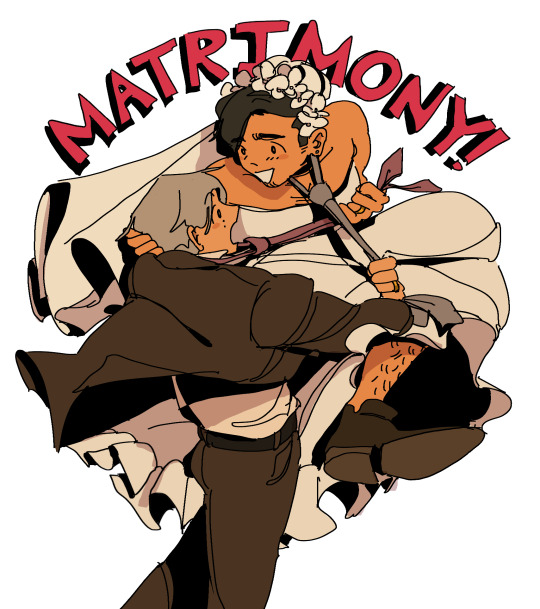
playing w them like dolls this gay month
#milgram#ミルグラム#pretty art#shidou kirisaki#kazui mukuhara#0507#this is the best birthday gift i think#op the way you have drawn them is so lovely.#bonus: i am such a kazui wedding dress truther
387 notes
·
View notes
Text
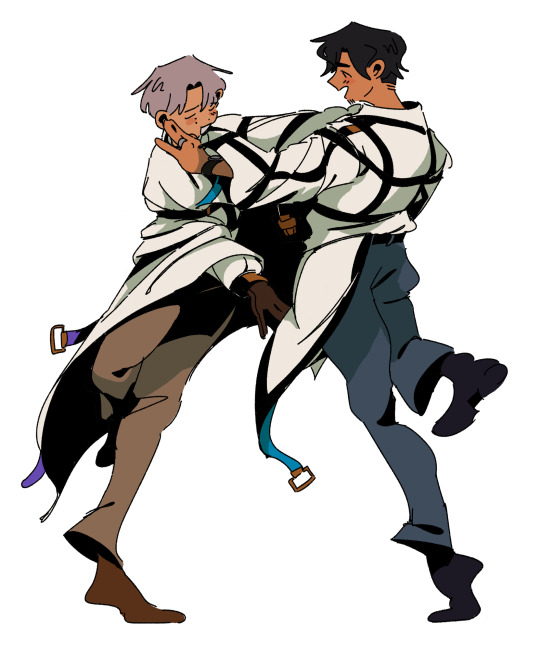
is this anything
619 notes
·
View notes
Text
more on shidou and persephone (and other things) from me and pupa @ruptinea
cr: voice drama 1, voice drama 2, persephone wiki page
in both mvs shidou is in the real world first and walks into a place that looks like it's not placed in reality. in triage this place is a mortuary and it's supposed to be his house where he meets his family.

in throw down the greenhouse is also the place where he meets his family (creating a person out of flowers). both of these places are surrounded with flowers, and the flowers in throw down are mostly tropical and the house in triage is surrounded with tropical plants. the greenhouse and shidou's home are supposedly the same place.

When Hades was informed of Zeus' command to return Persephone, he complied with the request, but he first tricked her into eating pomegranate seeds. Hermes was sent to retrieve Persephone but, because she had tasted the food of the underworld, she was obliged to spend a third of each year (the winter months) there, and the remaining part of the year with the gods above.


(x) Shido: Hm… But, this place does smell of the dead though. I’m sure that some sort of death will lie at the end of Milgram. Es: Smell of the dead? Shido: Yes. I can somewhat recognise it from experience… A place which is filled with the smell of the dead, that is.
the greenhouse and shidou's home are the underworld where he got trapped in and feels like he belongs there, might be (one of the reasons) why he insists that he should die already. these places are a morgue in reality, pupa said that the organ extraction and preservation happens in the morgue (upd: the bodies go to surgical center where the organs are removed and conserved then it goes to morgue, and these areas are placed in the same block when it comes to organ donation -pupa). in triage even when after he gains some will to live his very home becomes the morgue of the hospital, the underworld. like it is haunting or following him together with his feeling of guilt.
but when he walks in, there is purpose for his actions (his family). I think in triage we see his family clearly because after the experience in milgram he remembered what was his initial motivation - living for the sake of someone else. while in throw down his victim is a silhouette made out of flowers, like this is not someone relevant anymore. I'm also thinking of flowers being used for funerals, and considering that the flowers in the greenhouse are organs of dead people, in this sense the flower person is no more than a corpse.
If you could bring someone back to life, who would you choose? I can't choose anyone.
in triage his family is a dream, a vision, it disappears in the end but he remembers them again before putting on gloves. his family is gone but there is a new purpose now.
(x) Persephone, as a vegetation goddess, and her mother Demeter were the central figures of the Eleusinian Mysteries, which promised the initiated a happy afterlife.
Shido: Other than that… If this is the afterlife, then this place must be hell. But, if I set that idea aside, then… This is just real life. I, myself, am in normal condition; it’s where I am which is unusual. I may not know the reason behind this place or how it works, but even if I tried to escape from the reality of it, nothing would really change, right? Es: You sure are composed, aren’t you? Shido: That’s just my personality. I just simply don’t think bad of it—this place, I mean. Es: You mean, Milgram? Shido: Yeah, this place will put me to death.
The Mysteries represented the myth of the abduction of Persephone from her mother Demeter by the king of the underworld Hades, in a cycle with three phases: the descent (loss), the search, and the ascent, with the main theme being the ascent (ἄνοδος) of Persephone and the reunion with her mother.
(x) E: Anyways, your eyes sure have gained some life since we last saw each other. Back then, you always wore an expression that made it hard to tell whether you were alive or dead, but…



there is also quite a big emphasis on arcs/gates in both mvs, in throw down greenhouse is constructed with arcs, and in triage he walks past them/they appear in the background. they remind me and pupa of cemetery gates. there is also a thing with an entrance to the underworld, the door in triage separating the real world and the insides of the mortuary that are a dream/a vision.


it's romantic architecture which is most prevalent in Italy -pupa
The city of Epizephyrian Locris, in modern Calabria (southern Italy), was famous for its cult of Persephone, where she is a goddess of marriage and childbirth in this region.

in throw down it can be similar to mahiru's birdcage as the underworld that he's trapped in. but unlike mahiru who can't leave the cage shidou appears to be the one who is in control of the underworld.
While the return of Persephone to the world above was crucial in Panhellenic tradition, in southern Italy Persephone apparently accepted her new role as queen of the underworld, of which she held extreme power, and perhaps did not return above; Virgil for example in Georgics writes that "Proserpina cares not to follow her mother", – though note that references to Proserpina serve as a warning, since the soil is only fertile when she is above it. Although her importance stems from her marriage to Hades, in Locri she seems to have the supreme power over the land of the dead, and Hades is not mentioned in the Pelinna tablets found in the area.
The epithets of Persephone reveal her double function as chthonic and vegetation goddess. The surnames given to her by the poets refer to her role as queen of the lower world and the dead and to the power that shoots forth and withdraws into the earth. Her common name as a vegetation goddess is Kore. Günther Zuntz considers "Persephone" and "Kore" as distinct deities and writes that "no farmer prayed for corn to Persephone; no mourner thought of the dead as being with Kore." Ancient Greek writers were however not as consistent as Zuntz claims. In the religions of the Orphics and the Platonists, Kore is described as the all-pervading goddess of nature who both produces and destroys everything, and she is therefore mentioned along with or identified as other such divinities.

Shido: Please listen to me, Es. I’ve killed people. Lots of them as well. It was for such a selfish reason too. I’m a fine specimen of what a genuine murderer ought to be. [footsteps] There’s no reason for you to forgive me. And, I don’t have the desire to be forgiven either. I said that I wished to not be forgiven. But… because I was forgiven, I was able to save the lives of the other prisoners. That’s the truth. …I can’t ask you to not forgive me anymore. If I’m not alive, then I can’t protect their lives.
(x) The word chthonic, or chthonian, is derived from the Ancient Greek word χθών, "khthon", meaning earth or soil. It translates more directly from χθόνιος or "in, under, or beneath the earth" which can be differentiated from Γῆ, or "ge", which speaks to the living surface of land on the earth. In Greek, chthonic is a descriptive word for things relating to the underworld and can be used in the context of chthonic gods, chthonic rituals, chthonic cults, and more. This is as compared to the more commonly referred-to Olympic gods and their associated rites and cults. Olympic gods are understood to reference that which exists above the earth, particularly in the sky. Gods that are related to agriculture are also considered to have chthonic associations as planting and growing take place in part under the earth.
in throw down shidou is taking care of flowers while in triage he's carrying vegetables and fruits home. both mvs feature wilting or rotting of something that was fresh. he got both the power to nurture fresh plants and the power to make them wilt/rot.




the greenhouse in throw down is generally pretty dim, it's mostly done in brown palette, and there are a lot of shadows. while triage has a lot of light and blue/white palette, making it look heaven-ish.


In the Eleusinian Mysteries, her return from the underworld each spring is a symbol of immortality, and she was frequently represented on sarcophagi. The beliefs of these cults were closely-guarded secrets, kept hidden because they were believed to offer believers a better place in the afterlife than in miserable Hades.
(laugh) Not dead... Yeah, she's(?) definitely not dead... I finally understand the value of what I've been robbing people of...
At Locri, a city of Magna Graecia situated on the coast of the Ionian Sea in Calabria (a region of southern Italy), perhaps uniquely, Persephone was worshiped as protector of marriage and childbirth, a role usually assumed by Hera (in fact, Hera seems to have played no role in the public worship of the city).

For most Greeks, the marriage of Persephone was a marriage with death, and could not serve as a role for human marriage; the Locrians, not fearing death, painted her destiny in a uniquely positive light.

Zeus, it is said, permitted Hades, who was in love with the beautiful Persephone, to abduct her as her mother Demeter was not likely to allow her daughter to go down to Hades. Persephone was gathering flowers, along with the Oceanids, Artemis, and Triton's daughter Pallas, as the Homeric Hymn says, in a field when Hades came to abduct her, bursting through a cleft in the earth.
the name of the song is "throw down" -pupa
After Persephone had disappeared, Demeter searched for her all over the earth with Hecate's torches. In most versions, she forbids the earth to produce, or she neglects the earth and, in the depth of her despair, she causes nothing to grow.

Regardless of how she had eaten pomegranate seeds and how many, the ancient Greeks told the myth of Persephone to explain the origin of the four seasons. The ancient Greeks believed that spring and summer occurred during the months Persephone stayed with Demeter, who would make flowers bloom and crops grow bountiful. During the other months when Persephone must live in the underworld with Hades, Demeter expressed her sadness by letting the earth go barren and covering it with snow, resulting in autumn and winter.
(x) The fruit is typically in season in the Southern Hemisphere from March to May, and in the Northern Hemisphere from September to February.
throw down was released on dec 11th (winter). the real world is mostly done in pale, blue palette and while the scenery on the screenshot above is somewhat not real (it looks like dry desert) it appears to be actual autumn or winter outside, people are also wearing warm clothes.



however there are trees with leaves reflecting in the windows, and when shidou is walking away, supposedly going to the morgue, there are trees with leaves and blue sky with clouds.

the greenhouse is filled with colorful tropical flowers, it's sunny inside the first time it appears, and shidou's outfit is also pretty light, with tropical pattern on the shirt.

triage was released on march 22nd (spring) and in this mv he gets reunited with his family. the real world appears to be placed in spring or summer.

though the insides of the house and the frames with current time shidou are in cold palette again.

there is also a switch between spring-ish palette and winter-ish palette several times. the first time it happens with flashback/family shidou and current time/work shidou.


no idea what's going on with the cover art door but here are our observations on the wrap paper. maybe its wrap paper because we're not supposed to see what's wrapped inside -me. eternity (immortality/cycle of life and death), crowns (queen of the underworld), flowers/snowflakes (four seasons), etc etc

#milgram#ミルグラム#analysis#shidou kirisaki#some really good points here#i'll definitely keep these in mind going forward
72 notes
·
View notes
Text
shidou is a mother figure post
I don't know how to start this let's just get to it
cr: voice drama 1, voice drama 2, amane's vd, timelines
Family as a priority
I want to put as a disclaimer that I believe Shidou was an absent part of the family. He is bad at handling children, and he doesn't seem to be good at partnership either (saying he was relying on his wife). Gunsli explains it all in this post.
That said, the fact that he talks so much about prioritizing family above everything, and the way he's associated with children not only in his own behavior (his attitude towards Amane and Es) but symbolically (his first vd is named "Molech" which is associated with child sacrifices, and his name consists of kanjis "lion" and "child") has always been curious to me. Looking at it through the lens of traditional values and gender roles.
Shidou is a person who wants to be a Proper Member Of Society.
Why did you choose your current workplace? Because I thought it'd let me contribute to society.
So I'm not surprised that he got a "proper" profession which gives him a respectable, helpful position in society (which we see being recreated in the prison) and a "proper" family with wife and two kids at a pretty young age (judging by his children's appearances he was likely younger than 25 when they were born. Talking about this, education in medicine fields takes a long time, so he could be still in university or freshly graduated from university). However, rather than establishing himself through this social position, he's trying to establish himself through family and position of a father and a husband. "Family", "love" and "parenthood" are all strong motifs in his story, also considering he's paralleled with Mahiru who is very much "traditional family is the path to happiness in life". And in the end he prioritized saving his family member(s) over staying loyal to his work principles.
He also realized "what he was taking away from people" only after losing his own family.
"In order to save the life of someone you don't know, please let me kill your family," I told them. It doesn't even take much thinking to realize how cruel that is, but… I didn't realize it until the very end.
So his family was more of a value for him than his work, ideologically. The way he talks about his work in general makes me feel like he didn't really go for it as a "career". Like he chose it because he couldn't think of any another way to be "helpful" to others and not because it was interesting for him personally or promising financial stability.
Have you contributed to society? I had thought my work was a contribution to society.
Since I can provide treatment, I have to do something about it.
But… because I was forgiven, I was able to save the lives of the other prisoners. That’s the truth. …I can’t ask you to not forgive me anymore. If I’m not alive, then I can’t protect their lives.
I… I took a lot of pride in my work. I considered it a good deed.
I thought so, too. Doing it for a good cause... without a single doubt.
I think that Shidou perceives being a father/husband as something more honorable for him than being a doctor. Which is something associated with the gender role of a woman rather than the gender role of a man. In traditional gender roles men are supposed to prioritize career; being a good father and a husband is a bonus, achievement, but it's not the first thing that is supposed to define you. While women are supposed to be mothers and wives, to the point that "woman", "mother" and "wife" are synonyms - it's not an achievement but a standard. Father/husband is Shidou's standard. Besides, he became one at a pretty young age, and was likely preparing for it from an even younger age:
I started going out with my wife in the 2nd year of middle school, and we've been together ever since.
Finding a partner and getting married early is also something more expected from a woman than from a man. As I mentioned, while we don't know the exact ages of Shidou's children and his age when he got married, it's possible his family was completed before he finished university or right after it. Which makes me think of Mahiru again. I talk about it in detail in children and adults but here's a snippet from it:
When Mahiru shows obsession with romance, she's not only searching for ultimate happiness and way to brighten her possibly depressing life, but also for the sense of independency, in the only way that she can think of while growing up sheltered. She is almost finishing university but is not thinking about getting a job because do women even need jobs? Marriage and children are way more important matters to think about.
And it also makes me think of Mikoto, from the same post:
But he's doing everything that adults do! Have a job, overwork yourself, live alone. I don't remember where I've seen it, but someone mentioned that his apartment has really few pieces of furniture but there's a TV that is a symbol of "wealth", even though in the current year barely anyone watches TV, especially not someone who is 23. He also asks Kazui what kind of hobbies he has because he wants to have something he can do for a long time, maybe because Kazui is the oldest in the prison and significantly older than Mikoto compared to Shidou. "Being an adult" is like a checklist, once you check everything, you can be reassured that you're now mature and independent.
And here I see contrast between two male characters who want to be Proper Members Of Society (and take pride in being ones rather than Fuuta and Kazui who are miserable about not being ones).
Do you have a desire to get married? Yup. But that’s a story for after I’ve accumulated a good enough track record and go independent though.
What was the cause of your parents' divorce? He chose work over family. But well, at least that's what my mom told me, so who knows!
Because Mikoto, being the only man in the family, thinks that he must first establish himself as a professional in his field before he can even consider the possibility of having a partner. So, the fact that Shidou thought of getting a family and a job simultaneously, and possibly got a romantic partner even before he thought of his career plans (2nd year of middle school is like 13-14 years) is interesting to me. Shidou actually puts quite a big focus on romantic relationships in general.
Tell us about your dating history. I don't remember much but, I had one girlfriend in kindergarten, and in elementary school I had two relationships. I started going out with my wife in the 2nd year of middle school, and we've been together ever since.
Which makes me think of Mahiru again. They even have extremely similar answers sometimes.
What is the ultimate form of Love? Being together until death do us part. Being always together.
What are you willing to sacrifice for love? Everything. Everything.
Would you rather be the one to confess your love, or would you rather receive a confession? I think I'm the type to prefers to be the one confessing. I want to be the one to do it! Eh-! But I've always been the one confessing, so maybe I want to try being confessed to for once!
What is the definition of happiness? To be promised an unchanging tomorrow. Having a romantic heart.
Which implies they have a similar "romantic", idealized mindset on life and especially on partnership and family.
Did you have a good relationship with your family? Yes. It really was a family as happy as you could dream of.
And the fact that Mahiru has an idealized mindset on partnership has a lot to do with her being a woman. Romantic narratives are targeted at girls and women, and they are typically not expected to have interests outside of romance. The easiest example is that "shounen" as a category is more associated with adventure and action genres while "shoujo" as a category is more associated with romantic stories that explore people's feelings towards each other in-depth. Mahiru takes her knowledge on human relationships from these idealized stories. So again it's interesting to me how much Shidou shares the romantic mindset with her, like he was also taught it and lives by it.
Caretaker > protector
Shidou is exposing his savior complex in t2. Now, it's rather the gender role of a man that is associated with being a "savior" (prince saving the princess and whatnot). "Doctor" is also rather associated with men, while nurses/assistants are associated with women. But the thing is how Shidou "saves" people/takes care of them, especially in comparison to other characters.
Characters that have traditionally masculine traits (in behavior, appearance, or symbolism) are Fuuta, Kazui, Kotoko and John/Mikoto (uh, depending on who you think is who but I'll use just Mikoto). They all used brute force to protect other people, and have a focus on "physical strength" in general (the first three have a timeline conversation on this topic, and all four were involved with Kotoko's attacks). Fuuta, in t1, entered the interrogation being prepared for a fight and called himself the representative of the prisoners, because he was told by Yuno that Es was cruel to her during the interrogation; even on the internet he used verbal violence to "protect" others with bringing justice and punishing the wrongdoers. Kazui was sent to work in police and protected Fuuta from Kotoko's attack because his physical build allows him to do so. Kotoko and Mikoto self-explanatory.
Shidou though:
Mahiru: Shidou-san…… you’re really good-looking. Personally I think you’d be better if you ate a bit more, but you’re slim and tall, and well put together to boot…… You must’ve been super popular up until now, right?
State the meaning of your name. I think it means to wish to become strong like a lion. It seems I don't live up to that name at all.
Shidou is implied to not be physically strong. While we're here on the topic of appearance, I want to mention that he's said to be good-looking and popular among women several times:
Jackalope: Prisoner 05, Shidou. Well, I guess after me he’s the second most handsome here. But they always say the best-looking guys are nothing but trouble. Not that I’d know.
which makes me think of bishounen trope (bishounen refers to those younger than 18-20 but this is the most well-known term in non-Japanese fandom spaces so I'm using it):
(x) A popular Asian character type, the bishōnen, or "beautiful boy", is a male character that possesses androgynous or "feminine" physical traits. He is usually tall, slender with almost no fat and little to no muscle, and no body or facial hair.
Actually the very emphasis on his appearance can be seen as something associated with women, or rather the way this emphasis is made. It's worded like his appearance is used as a weapon of sorts.
But they always say the best-looking guys are nothing but trouble.
Shidou: ……yeah, that’s true…… I did my share of fooling around in the past. Mahiru: Oh~? That’s not the sort of answer I’d expect from you. I’ve got it! Somebody told you that if you replied like that people wouldn’t resent you so much, right?
In narratives especially, appearance being used as a weapon is mostly associated with female characters (femme fatale trope and such).
Back to the topic of saviors. The way Fuuta, Kazui, Kotoko and Mikoto are being helpful/caring to other people is through being protectors, guardians, shields and weapons. But Shidou is being helpful through being a caretaker and a healer. He doesn't protect from the attack but he helps to recover after it. This is a traditionally feminine way to be a "savior". Men are soldiers while women are nurses and such. Compared to traditionally masculine characters who are rather reactive and preparing for future attacks,
Kotoko: ……Mukuhara Kazui. Thanks to you, I wasn’t able to properly serve justice to those who did something unforgivable. I’m currently acting as an agent for our prison guard Es. Don’t get in my way next time. Kazui: Oi oi, don’t be silly, Yuzuriha-chan. There’s no way I could just look away from your outrageous display of violence. Anyway, even disregarding the fact violence against those voted guilty isn’t a part of Milgram’s system, what you’re doing is just acting recklessly based on a broad interpretation. As long as I’m free myself, I’ll stop you.
Shidou is calm, soft-spoken and providing, staying in the rear.
What are your thoughts on Amane's changes? The adults need to do something about it. It's frustrating because I can't move due to treating people's injuries, so I have no choice but to leave it to someone else.
As I mentioned earlier, the way he talks about his job makes me feel like he chose it because he couldn't think of any another way to be "helpful" to others. So putting these two ideas together he decided to be helpful through a traditionally feminine way.
While we're here (again) there's something that was noted by a person on twt back in t1, that post is now deleted I think but it stayed in my mind.
Shidou means "lion" (獅) (shi) and "juvenile, child" (童) (dou).
The first kanji means literally just "lion", but that person connected it to Chinese guardian lions:
(x) The male lion has his right front paw on a type of cloth ball simply called an "embroidered ball" (繡球; xiù qiú), which is sometimes carved with a geometric pattern. The female is essentially identical, but has a cub under the left paw, representing the cycle of life. Symbolically, the female lion protects those dwelling inside (the living soul within), while the male guards the structure (the external material elements).
There's also that one of Shidou's main narrative foils is Kotoko who is a woman expressing traditionally masculine traits (physically strong, makes being someone's "fang" (again, shield/weapon) her whole personality, puts a lot of emphasis on intelligence and logic, etc.) Kotoko is a woman who is fighting while Shidou is a man who is healing. Kotoko is muscular and has somewhat unremarkable appearance (with short hair that is easy to maintain and sport clothes, easily disguising herself) while Shidou is slim and noted to be handsome several times, like his appearance is one of his "strengths" or rather something he can use as a weapon. They are paralleled through being Amane's teachers:
Amane: ……what’s wrong, Shidou-san? Your hand has stopped marking. This is mathematics, so there’s no questions about the answers. If I got something wrong, please mark it with an X. Shidou: I…… I just don’t understand. If everything about MILGRAM is true…… why did a child like you have to become a murderer? Just imagining what sort of circumstances must have led to that, it makes me so sad……
……please give me back my test. It seems you don’t have the concentration levels required to be my teacher. I’m going to get Kotoko-san to teach me instead.
Kotoko: Treat you like a child? Hah, you’ve got to be kidding. Back when I was your age, I was already the person I am today. I don’t have any plans to let you get away with something just “because you’re a child.” ……remember that. There, I’ve finished marking. 83%. How do I put it… Even though you act like this, it’s not like you’re super brilliant at studying or anything, huh.
Kotoko puts a lot of emphasis on intelligence and logic as I mentioned earlier, Nott has some posts going in more detail about it (here and here). In these interactions with Amane I find it interesting that Shidou gets carried away and is considered incapable of teaching because he gets distracted by emotions. While Kotoko is rational, stoic, and criticizes, even scolds Amane as needed. Do I need to explain the stereotype that women are emotional and incapable of thinking while men are level-headed and the only ones capable of science. Especially that the emotion that distracts Shidou is pity towards a child.
Motherly behavior
More about traditional gender roles. "Mother" is expected to be soft and caring but also dedicated to the children and always looking after them. That often results in a behavior that is delicate on the surface but overcontrolling in its nature. "Mother knows best" sort of thing. (Shidou can be explained with a single "mother knows best" so well that I wish I could end here, but I'm a yapper) Which is a behavior that Shidou expresses a lot, and it also comes back to what I mentioned about him being heavily associated with children in his behavior: out of all prisoners, he's the one who is always somewhere near young prisoners trying to force his concern onto them. His good intentions ending up in behaviors that are intrusive and uncomfortable, or him straight up saying "you're wrong let me explain how to do everything Properly" but disguising it with "I'm just concerned".
Now, Shidou, in general, appears pretty non-pushy in his personality. In the beginning of the trials, he seems kind of shy in conversations with people, often makes pauses in his speech, like he's hesitant or careful, or gets lost in his thoughts/prefers to keep his thoughts to himself (like in the conversation where he's teaching Amane). He doesn't want to bother and is not good at communication.
Shidou: ……do you mind if we talk? It seems you’ve relaxed a bit more recently, Kusunoki-kun.
I see…… In which case, I wonder if I could ask for a box of cigarettes? I don’t want to be a burden, so I don’t mind if it’s the same brand as whatever Mukuhara-san is getting.
Shidou: ………… Is that so… I apologise. I’m sure everyone else will be happy to eat it, so don’t worry about it. Sorry for intruding.
I'm not sure what to say to that…
He's also noted to be reserved in his expressions.
Shidou: No, I know nothing. ……I’ve never really had an expressive face.
With the same expression no matter who comes I don’t feel scared because I don’t know
Presumably because he's suppressing his emotions in general, ending up feeling lost and indifferent in a way.
“NO” in my dream I am making you cry again, I am being blamed “NO” the hesitation I killed Is holding its breath and sniffing out lies
It becomes more and more diluted, it doesn’t have any flavor even if it’s chewed If it’s not needed, I’m not interested Here and there is such a waste There’s no meaning in it, yes and no, it doesn't matter. It’s all how you say it
No thank you, it’s none of your concern
The correct answer, I don’t yet know But there are lives that need safeguarding
That is to say I think Shidou is straight up shy and somewhat anxious person. So he is quite soft-spoken and delicate in his behavior. Nott noted on this topic that the way he cuts flowers in Throw Down is tender, he's not shown doing anything brutish. And the way he forces his concern onto young prisoners also appears pretty delicate on the surface. He's not being sharp like Kotoko. But behind this seemingly soft attitude is an anxious desire to control his environment, so everything can be Proper, the world can be the way he wants it to be so nothing bad can happen again.
What is the definition of happiness? To be promised an unchanging tomorrow.
Because mother knows best, and knows what should be done so everything can be good. And so his attitude towards young prisoners starts as soft and develops to be more and more forceful in a subtle way.
Shidou: That’s good…… You were crying so much, so I was concerned for you. ……yeah, I’m sure. Your family will definitely be worrying about you. I…… hope you can go back soon. Mu: Shidou-san…… did you come here to comfort me……? I’m sorry, I’d thought you were…… a scary person…… fufu.
Shidou: Sakurai-kun……? Show me your hand. Haruka: Heh!? No, I…… There’s, n-n-nothing wrong. Shidou: Show me. ……the palm of your hand is bleeding. I’ll have to disinfect it.
Amane: I don’t need it. I’ll gratefully accept your well-wishes, but I don’t eat things like that. Also…… Shidou-san, I can’t say I’m especially fond of the way you assume that all children will love frivolous things like this. Shidou: ………… Is that so… I apologise. I’m sure everyone else will be happy to eat it, so don’t worry about it. Sorry for intruding.
Shidou: Amane…… I don’t think that’s true. However smart you may be…… you’re still just a child.
Shidou: No, I don’t understand. It’s my job as an adult to teach you that throwing a temper tantrum isn’t going to make everything go your way. If it’s a test of endurance you want, I’m happy to oblige, Amane.
Through both of his voice dramas he's trying to convince Es to make their judgement according to his advice.
You're being annoyingly persistent, Shidou! Know your place here.
Because he knows better.
If you want to hand down the correct punishment for me, then all you have to do is put an end to my life and it'll be over in a blink of an eye.
This sick joke, I can’t take it any more, I surrender You don’t even know yet, and yet
It's also like he is constantly evaluating Es' capability in their interactions. Explaining when they make a mistake, or praising them when they're right in their knowledge.
Ah, well… I was just thinking about how despite being a child, you've really done your research on this.
I don't know what circumstances you face while guarding this prison nor the reason as to why you're doing it, but I'm sure that it must take a toll on you emotionally as well. So, please do your best. *Pats head*
Shidou: I see… If I feel pain, then it's proof that I want to live? Es: Hmph! Shidou: ...Well, with that being said, here's my counterargument to it. It was the nociceptors in my shin which felt that pain. So, it's nothing more than a reaction caused by pain signals being transmitted to my spinal cord and then to my brain. That phenomenon is called nociceptive pain. Es: What? Shidou: What I'm saying is… Even if I do want to die, pain is something which will still involuntarily occur. And therefore, you, Es-kun, were making a mistake in your claim.
Shidou: Let's digress for a moment. Have you studied criminal law? Es: Well, the most important parts at least. I've been learning about it since I started working as the Guard. Shidou: Excellent. So, for example, if someone harbors a criminal or tampers with evidence in order to protect that criminal, that is a crime in itself, right? Es: That's articles 103 and 104. Shidou: You remembered well. Can you recall article 105 as well?
Nott has a post on Shidou and Mahiru paralleling Amane's parents. Here's a more proper/elaborate phrasing of my tags on it: I think that Amane's situation, the way both of her parents are emotionally neglecting and her mother is abusive, makes her view her parents as sort of concepts. A concept of criticizing and overcontrolling parent on one side - her mother, and a concept of loving parent that will praise her but doesn't have enough time for her on the other side - her father. Shidou and Mahiru end up paralleling these concepts. With Shidou being the concept of "overcontrolling mother".
Amane: Shidou Kirisaki… His actions violate our rules. I have given him a warning. If he continues, I suppose it will be inevitable for me to intervene.
State the name of your victim. There is no victim. Only those who were served punishment.
Is there anything you wish your parents would have done? My mother should have kept her faith to the very end.
Is there anyone you hold in high esteem? My father. My father has been on a journey for a while, but that is something very honorable.
What are your thoughts on Amane's changes? If I were healthy, I would want to play with her a lot…
What do the people you respect think about your sin? I just followed what I've been taught. So obviously they'll praise me and tell me that I did good.
If you had to make one of the prisoners part of your family, who would you choose? Shiina Mahiru. Her innate goodness might have brought the two of us closer, maybe.
Flowers & pomegranates
Smaller details that might or might not be relevant but Shidou is heavily associated with flowers and flowers are associated with femininity. His image color is violet/wisteria/lavender shade all of which are derived from flower names. The other characters I can remember being associated with flowers are female characters who are the most gender-conforming out of the cast.


Also pomegranates or something
(x) Zeus, it is said, permitted Hades, who was in love with the beautiful Persephone, to abduct her as her mother Demeter was not likely to allow her daughter to go down to Hades. Persephone was gathering flowers, along with the Oceanids, Artemis, and Triton's daughter Pallas, as the Homeric Hymn says, in a field when Hades came to abduct her, bursting through a cleft in the earth. After Persephone had disappeared, Demeter searched for her all over the earth with Hecate's torches. In most versions, she forbids the earth to produce, or she neglects the earth and, in the depth of her despair, she causes nothing to grow. When Hades was informed of Zeus' command to return Persephone, he complied with the request, but he first tricked her into eating pomegranate seeds. Hermes was sent to retrieve Persephone but, because she had tasted the food of the underworld, she was obliged to spend a third of each year (the winter months) there, and the remaining part of the year with the gods above.
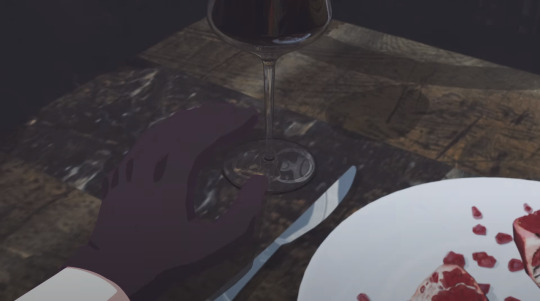
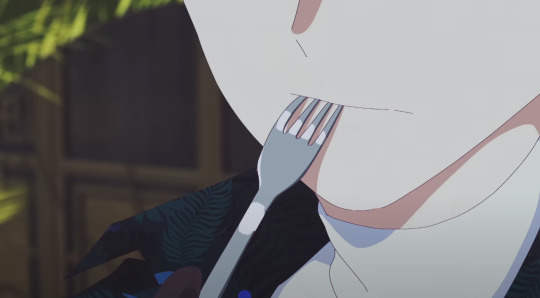
From what I know this story is focused on the grief of a mother/reunion of a mother and her child although in mass media it's interpreted in the context of romantic relationships.
Regardless of how she had eaten pomegranate seeds and how many, the ancient Greeks told the myth of Persephone to explain the origin of the four seasons. The ancient Greeks believed that spring and summer occurred during the months Persephone stayed with Demeter, who would make flowers bloom and crops grow bountiful. During the other months when Persephone must live in the underworld with Hades, Demeter expressed her sadness by letting the earth go barren and covering it with snow, resulting in autumn and winter.
There are trees without leaves outside but trees with leaves reflecting in the windows. There are also both dry/wilting and living flowers in the greenhouse. Also the general switching between empty real life landscape (which could as well be autumn or early winter) and greenhouse with colorful blooming flowers.


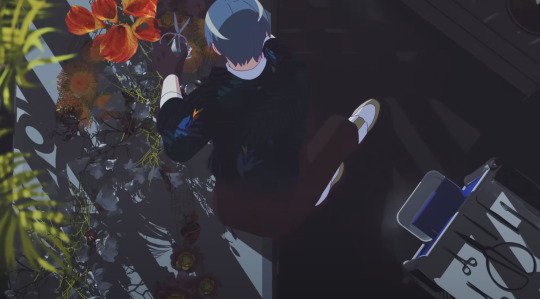

THE END!!!!!!!!!!!!! writing this killed my brain in million ways I can't do this anymore
85 notes
·
View notes
Text
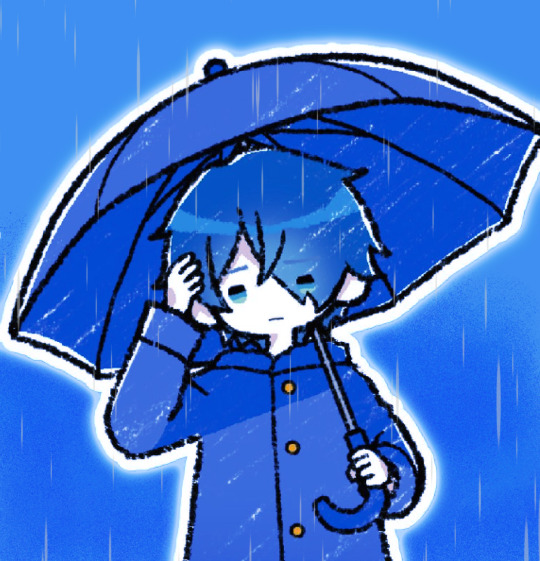
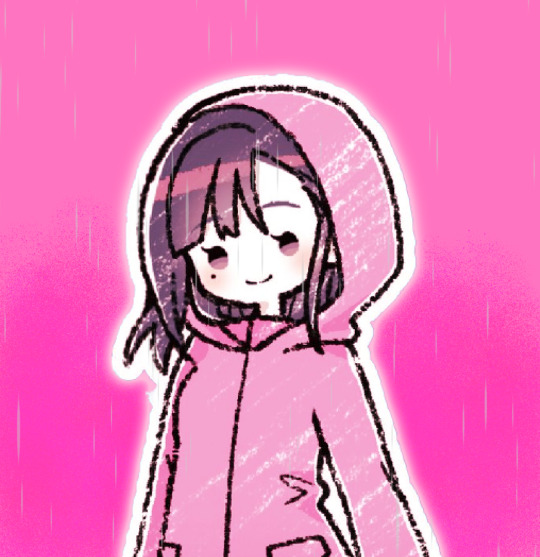
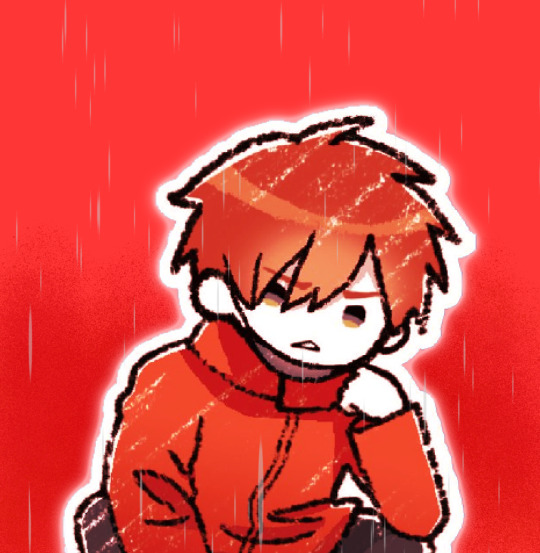
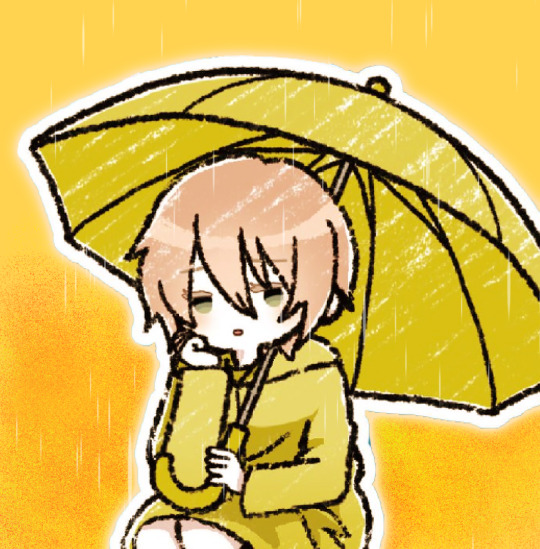
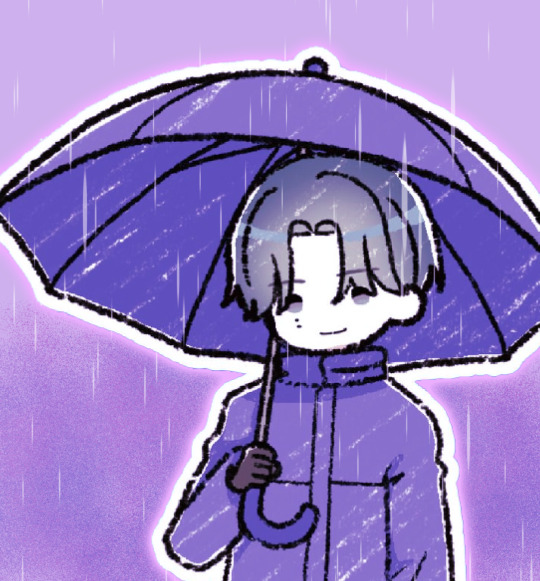
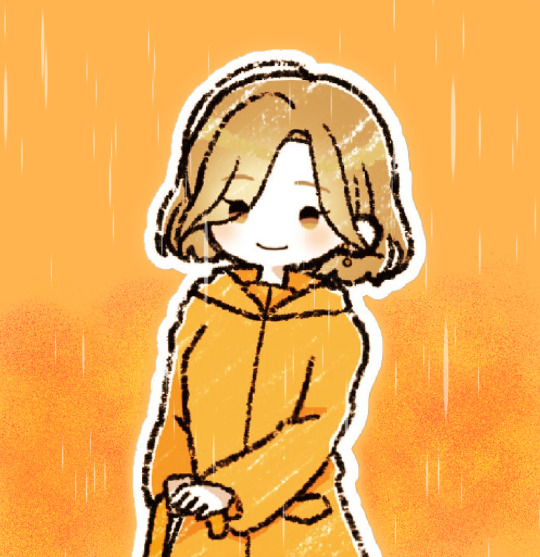
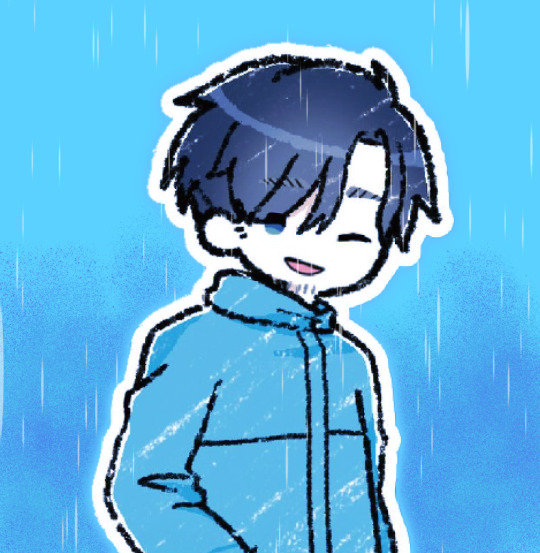
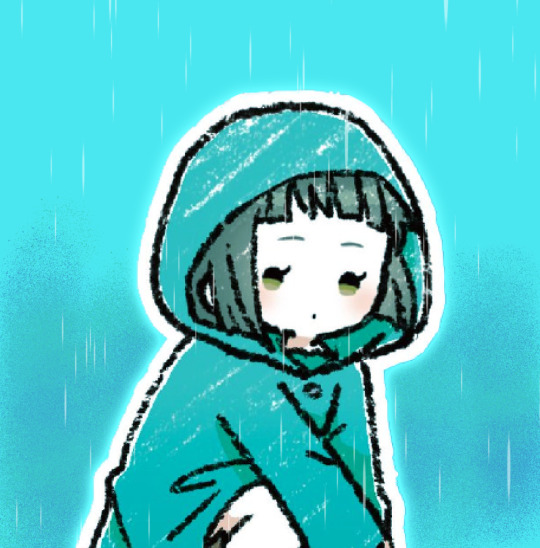
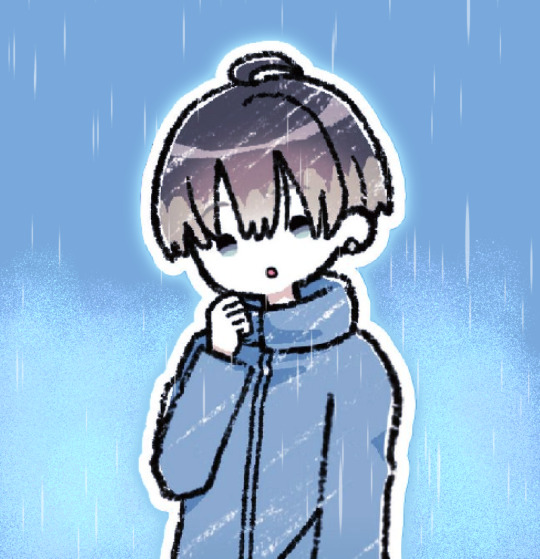
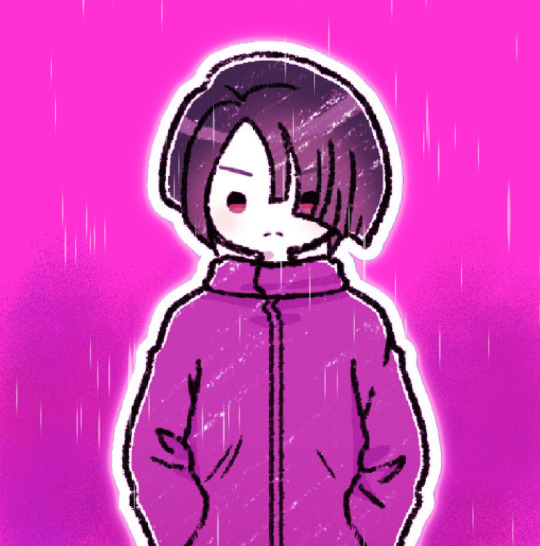
milgram eeo store collab icons!
(transparents by: @ranmaru-kageyama)
(credit is not needed, but appreciated)
#these are very cute!#i think it might be nice for me to change my icon#so thank you for these#edit#milgram#ミルグラム#milgram icons
243 notes
·
View notes
Text
Milgram Eeo Store Collab Art Analysis Part 4/4: Mahiru and Mikoto
The other unforgiven prisoners, Mahiru and Mikoto, are different.

In Mahiru's case, although not protected by it, she still clings to her umbrella — to Milgram. Rather than rejecting it, she forgives the verdict and how it harmed her. She still has hope for it, even appearing to lean on it to some extent. She still longs to be saved and forgiven, to receive salvation and comfort from Es and the audience.

In Mikoto's case, he is also not protected, but rather than facing away from the umbrella and rejecting it entirely, he faces it instead. He's not quite as hopeful as Mahiru, he's not clinging to the possibility of comfort the way she is — but he hasn't given up on it either. I think this represents the way Mikoto gave his verdict serious consideration without rebelling against it, even doubting himself and his own memories in the process.
Anyways, thanks for bearing with me! I always enjoy digging into analysis like this. Do let me know if you have any thoughts of your own on my analysis, or on the artwork itself :]
24 notes
·
View notes
Text
Milgram Eeo Store Collab Art Analysis Part 3/4: Fuuta and Amane
All the prisoners depicted with their umbrellas closed weren't forgiven in Trial 1. Thus, just as they are unprotected from the rain, they remained unprotected from our negative influence. Some of them reject protection (or at least the idea of hope and salvation through Milgram's judgement system) entirely, but not all of them do.

Pictured above are the unforgiven prisoners depicted facing away from their umbrellas — Fuuta and Amane. My theory is that their facing away from their umbrellas represents the way they rejected their verdicts and chose to isolate themselves and withdraw rather than attempting to derive any comfort or approval from Milgram or Es's judgements going forward.
Edit: I made a note of this in my last post, but I also can't help but notice the way Yuno and Amane, the characters who most vocally resisted their verdicts in Trial 2, are the only ones who were depicted wearing hoods. In the same way that wearing a hood often restricts one's vision and ability to hear clearly, they both turned inwards and away from those around them upon learning how they'd been voted, refusing to listen to anyone else and becoming distant.
25 notes
·
View notes
Text
Milgram Eeo Store Collab Art Analysis Part 2/4: Yuno, Kazui and Kotoko

Pictured above are the forgiven prisoners depicted not using their umbrellas — Yuno, Kazui and Kotoko. My theory is that their choice not to use their umbrellas represents the fact that these three were either neutral to their verdicts or rejected them. In Yuno and Kazui's case, facing away from their umbrellas, they reject Milgram's protection, turning away from the comfort of believing in their innocence just because the audience tells them it is so. In Kotoko's case, she aligns herself beside her umbrella rather than allowing it to protect her — placing herself alongside Milgram's power instead of beneath it. In doing so, she refuses to take comfort in it, but she also hasn't rejected it entirely — because although she operates on her own terms, at the time, she wanted to be Milgram's equal and work alongside it.
Edit: I also can't help but notice the way Yuno and Amane, the characters who most vocally resisted their verdicts in Trial 2, are the only ones who were depicted wearing hoods. In the same way that wearing a hood often restricts one's vision and ability to hear clearly, they both turned inwards and away from those around them upon learning how they'd been voted, refusing to listen to anyone else and becoming distant.
49 notes
·
View notes
Text
Milgram Eeo Store Collab Art Analysis Part 1/4: Haruka, Muu and Shidou

I wrote down some thoughts I had about this recent collab art produced for some new merch. I guess the content drought must be hitting me hard. This is part 1, but I aim to cover all of the characters.
All the prisoners depicted with open umbrellas in this collab artwork were forgiven in Trial 1 — and thus they were protected from the deluge of negative influence from the audience, given the chance draw comfort from Milgram's decision (said comfort here represented by umbrellas). But not all of the forgiven prisoners accepted their verdicts — some rejected them.

Haruka, Muu and Shidou are similarly depicted in this collab in that all three of them both have and are using open umbrellas, uniquely compared to the other prisoners. The forgiven prisoners who are using their umbrellas (Haruka, Muu and Shidou) are the ones who were most accepting of their verdicts — who went along with the result of their votes and were (seemingly) influenced positively by them.
Edit: I also think it's worth noting Haruka's conspicuous Muu colour adjacent shoes. They're a cute fashion choice, for starters, but I also wonder if they represent her powerful influence on him...
22 notes
·
View notes
Text
Milgram 4th Anniversary Art Analysis Part 3/3: Muu, Mahiru, Amane and Kotoko
(TW self harm mention)
Muu
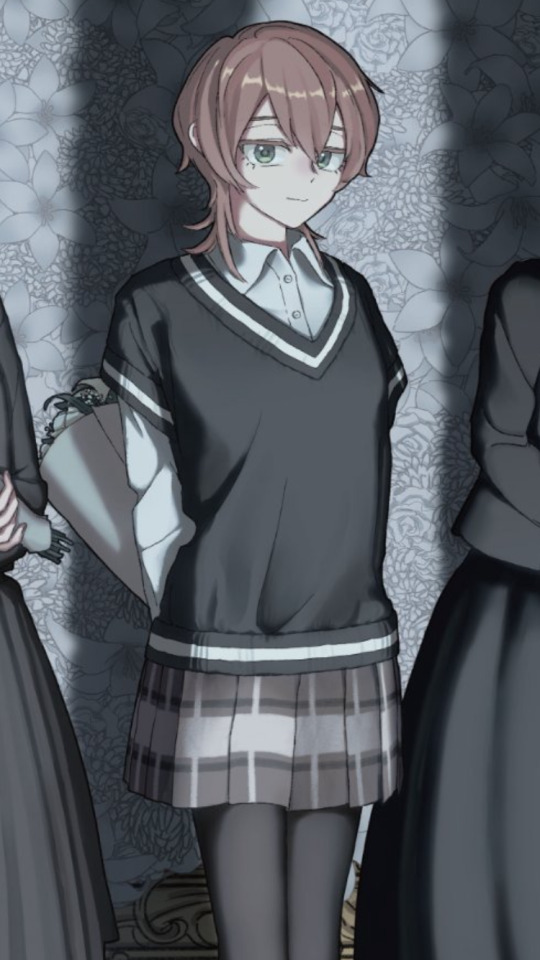
The overall visual impression of Muu's pose gives off a strong sense of 'oops' — sort of teasingly hiding her bouquet, that is, her crime, behind herself like a child hiding a cookie they pilfered from the kitchen behind their back. But she doesn't seem particularly worried about being in trouble — she seems to have faith that she will be forgiven. Still, it's obscured by the shadow of her, jutting herself confidently forward to meet the viewer first — my thought was that Muu is emphasising herself and her personality foremost, wanting her crime to be an afterthought to one's impression of her. But unlike Amane, Muu hasn't dropped her crime entirely — she still holds it, securely enough that none of the petals are falling — she's aware of it and doesn't reject the fact that it happened. She is wearing a school uniform similar to the one she wore in her first music video. As of season 2, Muu often hides her hands behind her back — as if to hide her true intentions and underlying nature, but also perhaps to propel her forward. I might be reaching, but I wonder if Muu often holds her arms or hides them behind her back, often wearing slightly too long or what could be called ‘moe-style’ sleeves, because of the fact that, as we might infer from her carrying a box cutter at school, she might have been someone who engaged in self harm in the classic sense...? Even in her birthday art, in which her inner arms were technically uncovered, we couldn't see them, because that part of her arms specifically was carefully hidden.
Mahiru
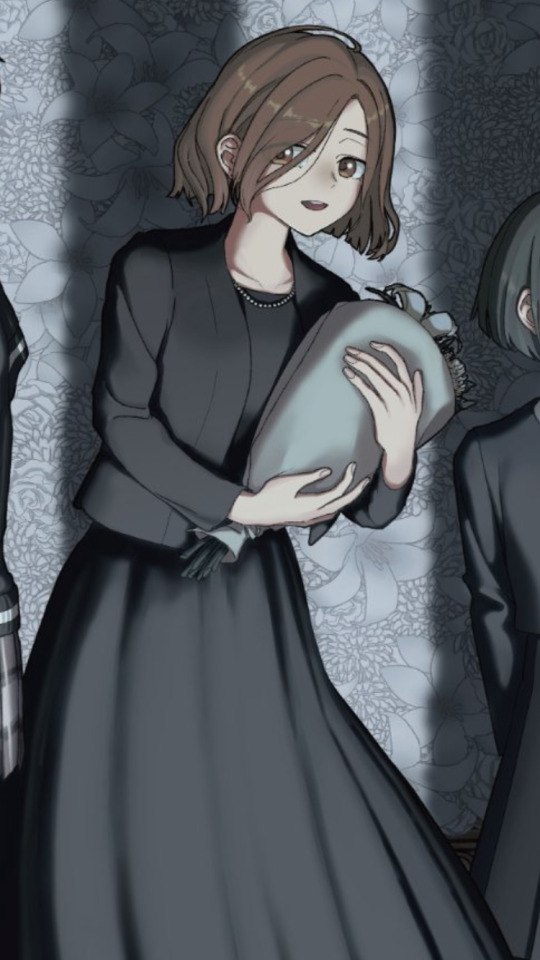
Mahiru's pose feels very reminiscent to me of a classic romance genre protagonist. She actually posed similarly in one shot of TIHTBILWY. It also sort of almost looks a little like she just caught a bouquet at a wedding. Her outfit is more formal than the sort of thing she usually opts for, featuring the funeral classic pearl necklace which usually symbolises mourning (perhaps symbolic of her mourning her boyfriend?). She holds her bouquet in front of her with no attempt at pretence, also cradling it a little like a baby, as Shidou and Yuno did, but it looks to me a little more like the way one might hold a pet rather than a human baby. She's hugging it close to herself with affection, without the detachment that Yuno exuded when it came to her own bouquet — but also leaning into it a little possessively. I get the strong impression it would be difficult to get her to let go of the bouquet or give it away. I think her hold on her bouquet reflects her attitude to her supposed crime and its victim — she holds it lovingly, hugging it very close as if it's precious to her — but close enough and tightly enough to perhaps to crush something as fragile as flowers...or a human life. She's the only prisoner besides Haruka who is smiling open-mouthed, perhaps reflecting her general cheery attitude to life and doggedly sunny demeanour.
Amane
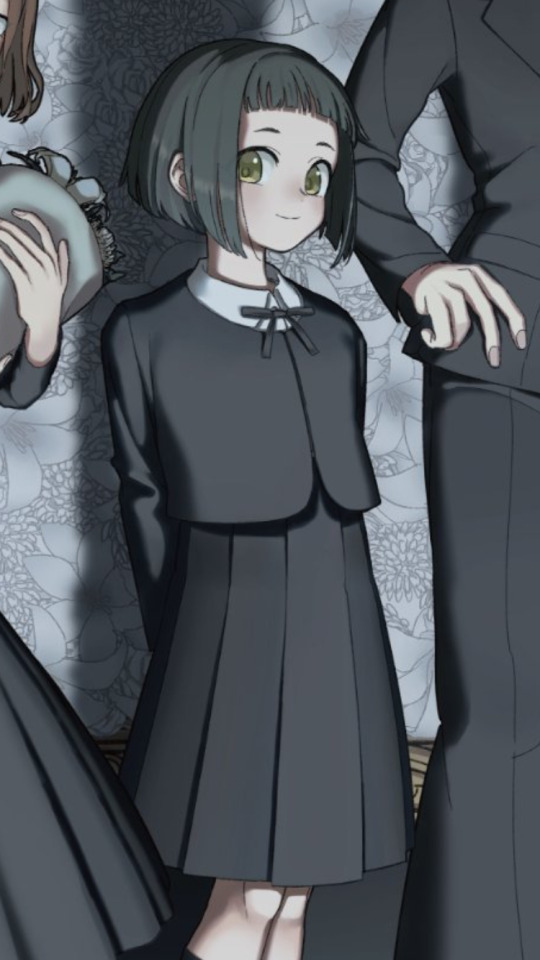
Amane's pose is similar to Muu's, but a little more open and decisive. Like Mikoto, she sort of looks like she's standing to attention and trying to be presentable — to be a ‘good girl’ — but unlike him, her hands are hidden entirely. She forgoes the cheeky slightly bent leg that Muu has to stand resolutely straight and face boldly outwards with more open body language. Her outfit is very much classic little-girl-at-a-funeral fare, complete with the cute mary jane type shoes that she usually wears. I think the way she has entirely turned her back on her crime, her bouquet lying on the floor behind her, partially in her shadow and falling apart, reflects how she rejects acknowledging it as a crime at all. She's not trying to hide it at all, but she refuses to carry it with her the way everyone else does — even Mikoto. She refuses to consider the possibility that it's a crime at all. I also think it might reflect her refusal to offer her victim or really anyone any special respect. She's polite to everyone, but only god has her full respect. If she were at her victim's funeral, she would refuse to even offer them flowers — refuse to lower herself. I already covered the small gap visible in the wrapper of her bouquet, much like Haruka's.
Kotoko
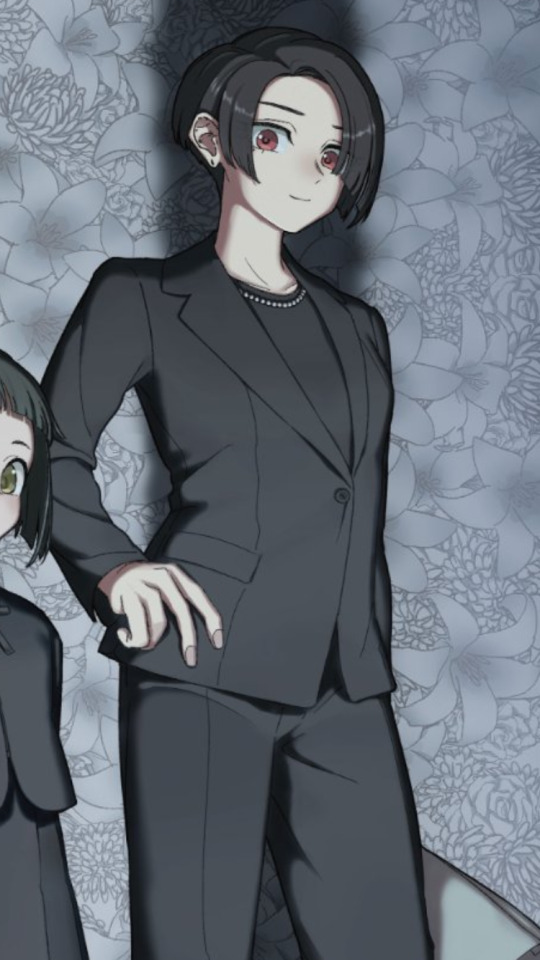
Kotoko's pose feels confident and open and accepting — she knows how she is viewed, and anticipated it. She's neatly done up her jacket and even wears a mourning pearl necklace, which I think seems odd since she arguably mourns close to the absolute least out of anyone in the cast. She's the only female character to not be wearing a skirt in the cast, just as she usually is, perhaps reflecting her practical attitude and readiness to slip into combat at any moment (though she is wearing heels...). Interestingly, she appears to have taken out her piercings for the funeral — perhaps as if defanging herself. I'm not sure why she has them in the first place, but I always sort of figured they reflect the way she goes against the grain and generally resists society's conventions to follow her own path of supposed justice, no matter how much it might hurt or cost her. So, why would she remove them for the funeral of her victim(s)? I wonder if this perhaps reflects how she likely still had to try and present herself in fitting with society for the most part whenever she wasn't directly engaging in vigilantism — she went to court for her murder of that child trafficker and won, after all. I wonder, then, if she defangs herself for her own social benefit temporarily where needed, but, since her piercings haven't closed up, it's not difficult to rearm herself, as it were. I find it interesting that Kotoko is another of the few who doesn't hold their bouquet in front of themself — instead she holds it sort of behind herself but not completely out of sight, a little like a weapon. Like a threat. A little carelessly perhaps, but nonetheless securely, considering that despite how her bouquet hangs down like Haruka's, none of the petals have fallen off as of yet. This might reflect how she doesn't regret her murder(s?) or feel guilt, and she's locked and loaded to go again (at least according to her relaxed and almost combat-ready body language), but she refuses to acknowledge them as crimes. It might also reflect how I have the impression that thus far she seems to have wanted to keep the underlying outright bloodlust that I think Deep Cover certainly implies hidden from Es and the viewer.
#milgram#milgram project#ミルグラム#analysis#character analysis#muu kusunoki#mahiru shiina#amane momose#kotoko yuzuriha
25 notes
·
View notes
Text
Milgram 4th Anniversary Art Analysis Part 2/3: Haruka, Es and Yuno
Haruka

Haruka's pose sort of reminds me of Mikoto's, but it's a little looser, less organised. Similarly to Mikoto, he doesn't want to come across as a threat — wants to appear open — but he doesn't quite get it right. Like Mikoto and Shidou, his suit is fully done up. His tie is a little loose too, but I'd hazard that it's because he doesn't know how tight it should be, or hasn't noticed. His pose is largely open but one leg is still slightly bent and he's facing sideways — subtly somewhat mirroring Muu's pose, just as he does in his Trial 2 sprite art. I think the way he is holding his bouquet, in front of himself and upside down, mirrors the way he is largely quite open about and accepting of his crime, but also him as a person in the sense that he is blatantly unconventional and takes an unusual and confusing approach to things. The flowers in his bouquet are actively slipping out of it, falling on the floor, but he either doesn't care or hasn't noticed, perhaps reflecting how he has a sort of reckless approach to things and often ends up inadvertently causing damage and chafing against the status quo. He seems to know more or less how he should hold the bouquet but manages to bluntly get it the wrong way around. His hold isn't quite as secure as Mikoto's, though similar — as if he wants to similarly come across as unproblematic but isn't really sure how. He's the only male prisoner smiling with his mouth open, but his smile is sort of uncomfortable and awkward, coming across as more nervous than genuinely at ease. There's a visible small gap in the wrapper of his bouquet, which Amane's also seems to have. This is interesting to me. I'm not entirely sure what it represents...perhaps some sort of metaphorical 'crack' in their lives or their relationships with their victims, since, at least as far as I'm concerned, they were both family members?
Es
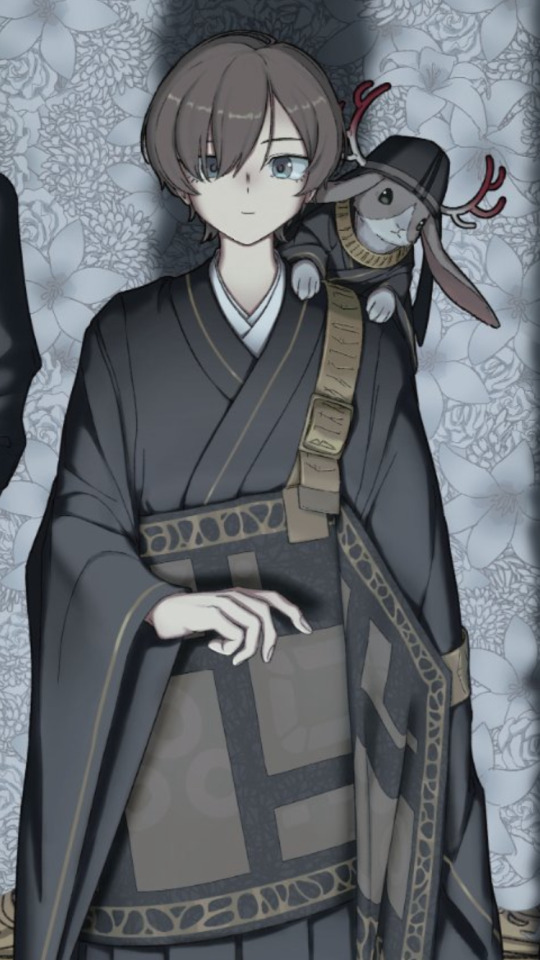
Es' demeanour is very much in fitting with their Buddhist monk garb. At first glance I wondered if their hand gesture was perhaps a Buddhist mudra, but it doesn't seem to resemble any in particular that I came across. They are wearing a Japanese Buddhist monk's regalia, complete with yukata and kasaya, as well as traditional tabi-style (thonged) shoes. It's as though they are the officiator of the funeral that everyone is dressed up to attend, which is quite fitting — as, in a way, it's their duty to put the souls of the victims to rest. Meanwhile, I believe Jackalope's outfit is more in line with the attire of a Shinto monk or clergyman. It's sort of hard to tell, but the hat at least is much more in line with Shinto clothing.
Yuno
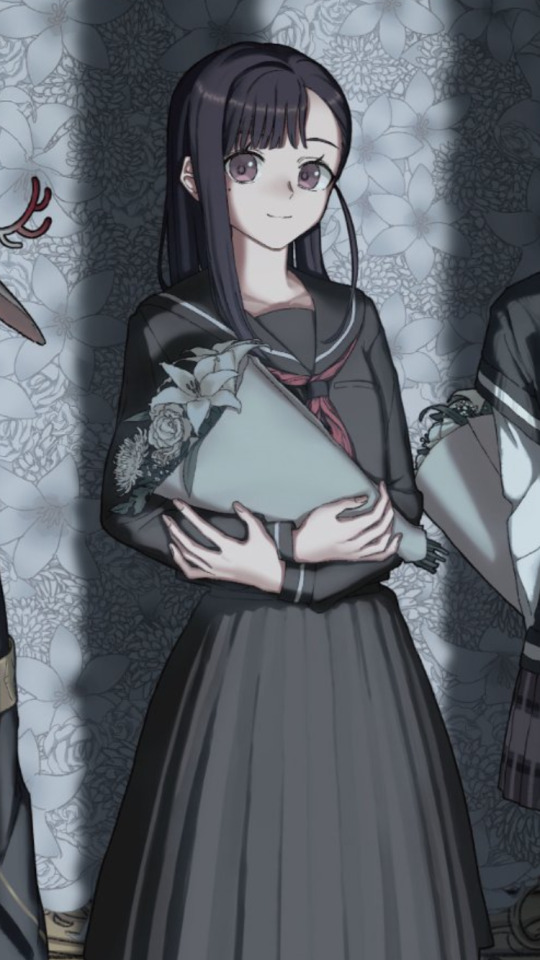
Yuno's pose is open and relaxed, much like her attitude to her supposed crime. She's been quite open and blunt about it from the start, after all. Her outfit is a tidy school uniform, a lot like what she wore in her first music video. Like Shidou, she holds her bouquet a bit like a baby, similarly very much in view of the spectator and without pretence, but she doesn't seem quite as concerned with trying to properly support its weight as he does, and I think her pose is overall less personal and more detached — like she's only holding the 'baby' in passing. It doesn't feel like she feels any particular tethering to the 'baby' or her supposed crime. Instead, one hand, while still technically supporting the first, also holds her own arm — perhaps as if to unconsciously seek warmth and support for herself — a bit like the way Yuno supports and comforts herself in her Trial 2 music video. This pose also sort of feels to me like her way of perhaps creating a pastiche of how society expects her to be — the gentle and polite picture of a youthful mother which she so adamantly rejects.
16 notes
·
View notes
Text
Milgram 4th Anniversary Art Analysis Part 1/3: Mikoto, Kazui, Shidou and Fuuta
I'm going to post these in a few parts since my analyses ended up getting so long...oops. Here's the first! Please let me know if I've slipped up at all or if you have anything to add.
Mikoto
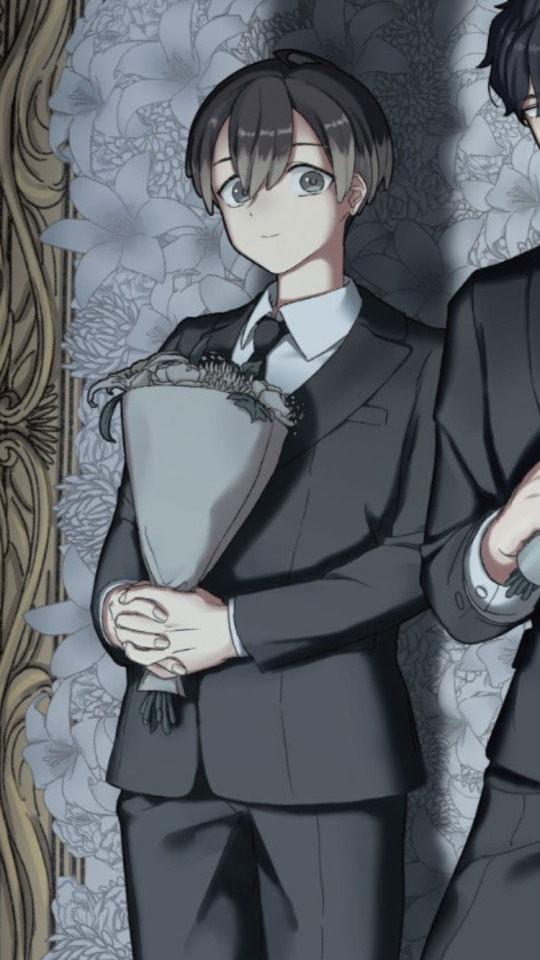
Mikoto is standing very straight and to attention with his feet together, in the same way that he carefully curates his public persona and tries his best not to stand out. His suit jacket seems to be fully done up, all neatly and presentably, and he's similarly removed his stud earrings. Trying his best to come across as unproblematic, respectful and polite. But he's also standing a bit like a corpse in a coffin, holding his flowers like a dead man in his grave. This is probably related to Mikoto's associations with the Death tarot card (which does not in fact signify death but a new beginning — rebirth in a way) and his VD being titled 'John Doe' (that is, the placeholder name for an unidentified dead body) — perhaps a part of him died when his alter John was born? But that part of him was also reborn as someone bolder and stronger...Mikoto could also be considered a dead man walking, perhaps, working himself to death...he holds his bouquet in front of him in full view, just as he presents himself and his supposed crime since he has no memory of it — believing he has nothing to hide, trying to come across as trustworthy.
Kazui
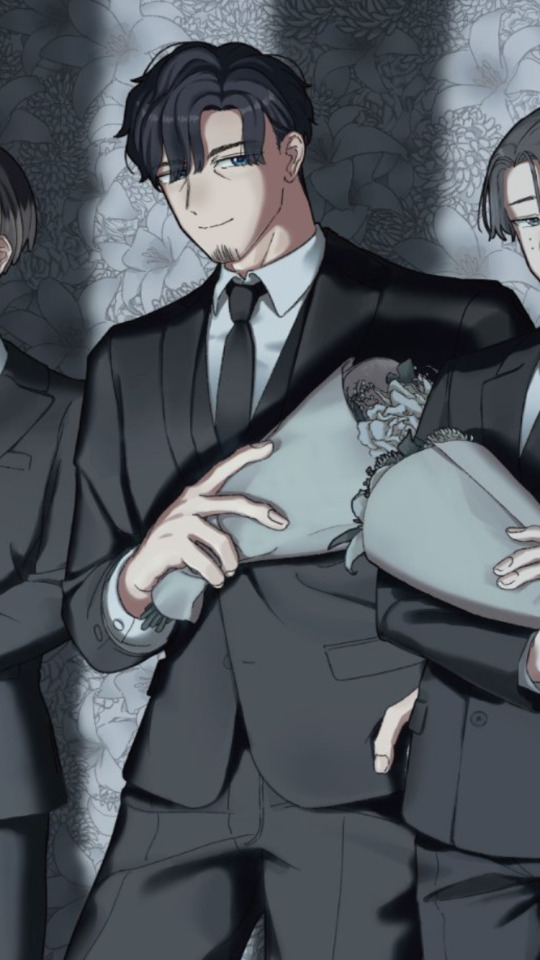
Kazui is standing in contrapposto as he often does, only leaning his weight on half of his body — refusing to lean into both sides of himself. He also has his jacket half buttoned up, affording it a slightly more casual visual effect, and I think his tie is slightly loosened (half loosened?) in keeping with his half/half theme and general deliberately casual approach to most things. As seen in Cat and in other artwork of him, he is wearing a waistcoat underneath his suit jacket. I find it interesting that Kazui is consistently depicted with that extra layer in formalwear. Maybe I'm reading into things too much, but I wonder if it's to do with his devotion to trying to fulfil a masculine ideal — the three piece suit is often considered one of the most masculine forms of attire. It's also often associated with performance imagery, like the magic tricks we saw him doing in Cat. Unlike the others, he insists on that extra layer beneath his jacket — almost as if just to make sure he's really playing his role to the best of his ability. An extra layer of constriction, even beneath his jacket...anyways, he holds his bouquet with one hand — with only half of himself — sort of nonchalantly. His pose sort of reminds me of the way an actor might hold a prop he is planning to gesture with, which brings to mind Kazui's performative nature. Kazui holds his bouquet in front of himself, but his holding it with one hand makes it sort of feel like he's holding back a little. He isn't exactly outright presenting it to the viewer like some of the characters do, but he's also not actively trying to hide it (anymore?), which seems to be his attitude to the circumstances of his supposed crime as well — just as he implored us to find out and uncover the truth about him in his second voice drama.
Shidou

Shidou's body language is more open and relaxed than Mikoto and Kazui's, sort of reminiscent of the way his sprite's body language opened up in Trial 2 when he settled into his saviour/healer role in the second season. I also get the impression that his tie is the least loose of the five male characters, though I'm not exactly a tie expert — very intentional and meticulous, just like Shidou and his actions. Like Mikoto and Haruka, his buttons are all done up as far as I can tell (it's sort of difficult to see behind his bouquet to be fair, but that seems in character). I think this reflects how the three of them have a more decisive and resolute attitude to their crimes: while Mikoto insists he didn't do anything, both Haruka and Shidou admitted to killing from the very beginning, and all three of them were initially very accepting of their circumstances (albeit because Mikoto was in denial). Haruka and Shidou already committed to dressing up for the funeral from the very start— they both accepted their circumstances wholeheartedly, at least to begin with. Interestingly, he's the only one whose jacket is double breasted. I looked into this to see if there might be any particular significance to this choice, but I don't think I found anything of particular note except that it makes him stand out a bit, kind of like his straitjacket design's turtleneck style collar and long coat do. Double breasted jackets are associated with the navy, but I don't think that has much relevance to him as a character. As for Shidou's bouquet, he holds it just like a baby, cradling it close to himself with a sort of parental tenderness. It's in full view of the spectator and he makes no pretence about it. I think this reflects his attitude to his victims and to his crime — perhaps it implies that he considers his own children his victims, too? But I could also see this just reflecting his general attitude to lives — at least those of other people anyhow.
Fuuta
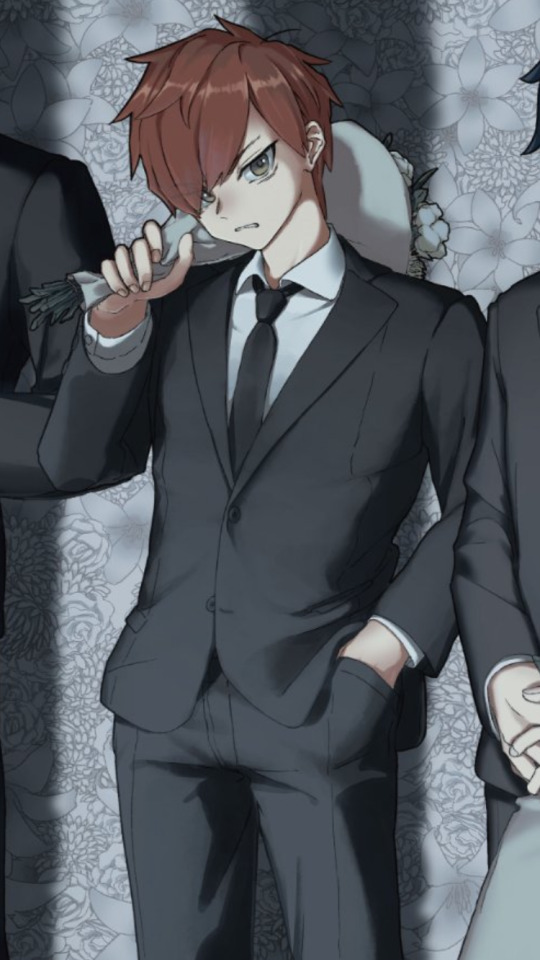
Fuuta's pose sort of reminds me of how a petulant teenager might stand at the funeral of a distant relative, irritated by the proceedings. It's quite open, like Shidou's, but much more defiantly so, leaning back slightly on one leg as if to challenge the viewer — sort of like a 'so what?' — much like he acted in Trial 1. He's not making much of an attempt to present himself formally or respectfully — his jacket is only half done up and his tie is the loosest of all the five male characters, one hand stuffed into his trouser pocket. I think this reflects Fuuta's general tendency to chafe against convention and expectations, but also his initial refusal to accept his circumstances and responsibility. He holds his bouquet behind himself but largely visible — refusing to accept responsibility or be open with the viewer, but still self-aware enough that it's not exactly hidden — I think this reflects how he acts standoffish but ultimately is only really superficially in denial. He does hold his bouquet a little like a weapon, but he doesn't seem fully committed — he's not really holding it like he's seriously trying to threaten anyone. He's the only one who isn't smiling at all, which is just like him.
#milgram#milgram project#ミルグラム#analysis#character analysis#mikoto kayano#milgram john#kazui mukuhara#shidou kirisaki#fuuta kajiyama
27 notes
·
View notes
Text

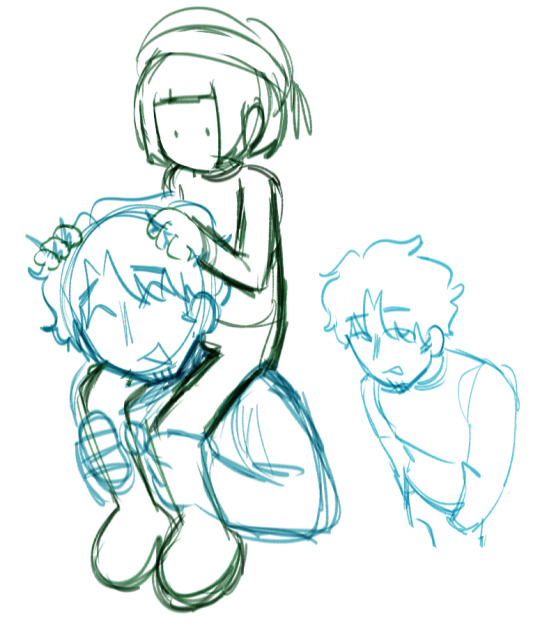



milgram doodles i drew today ^_^
#these are very cute#your doodles are insanely expressive#and there's a great sense of character to them too even with simple sketchy lineart#so obsessed with yuno calling out kazui's bs like this he low key needs this#milgram#kazui mukuhara#amane momose#yuno kashiki#haruka sakurai
117 notes
·
View notes
Text
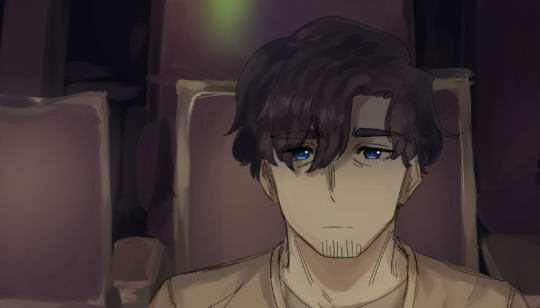
half thumbnail redraw 👍 mata areu noori ga mune wo shibaru
#there's a sort of tactile softness to your brushstrokes here that is very soothing to look at I think#your blue stands out beautifully#the original mv is gorgeous of course but i really like your lighting#milgram#pretty art#kazui mukuhara
185 notes
·
View notes
Text
all the Milgram characters drawn from memory!! guess my favourites (answers below the cut)

answers and my experience after drawing all of them
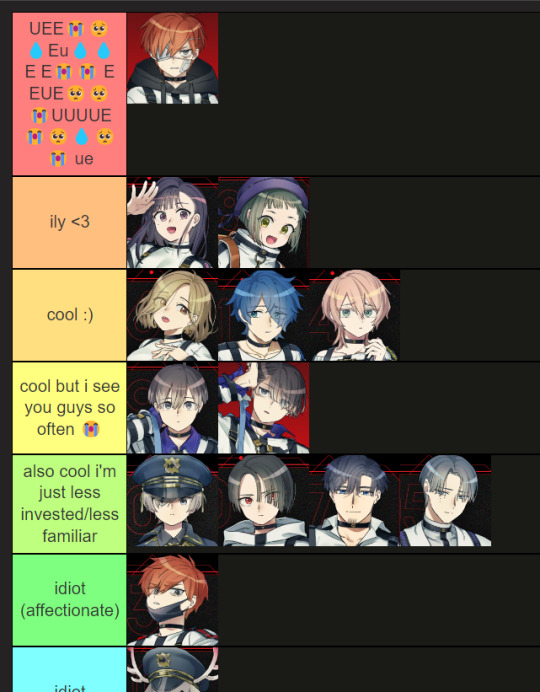

#aww these all came out absolutely lovely#i really like that you gave everyone their own MV prop#honestly from memory you did a wonderful job#milgram#pretty art#milgram es#haruka sakurai#yuno kashiki#fuuta kajiyama#muu kusunoki#shidou kirisaki#mahiru shiina#kazui mukuhara#amane momose#mikoto kayano
450 notes
·
View notes